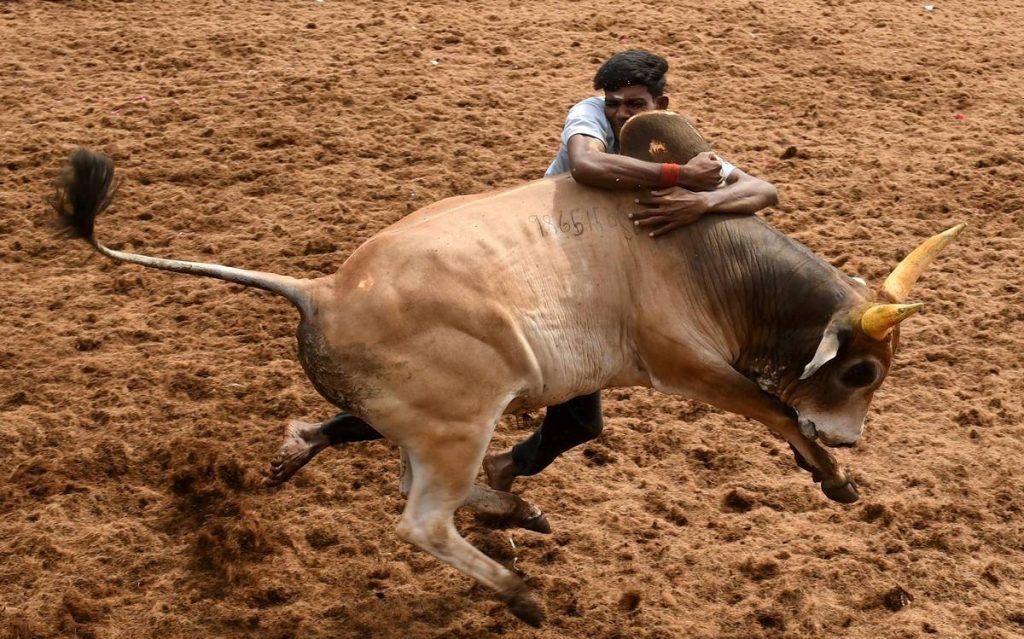
In the Indian context, there are many archaic practices and activities involved with various cultures of India. The rise of globalization, dissemination, and urbanization has led to a steady decline of the various activities that multiple cultures held in high regard. The diversity of India allows an individual to assess ancient cultural practices from multiple lenses – understanding their necessity, the value of a particular practice, the changing norms in a particular society, the growing intellectual capacity of a particular region, etc. Many parts of India continue to practice their ancient activities that pose a great challenge to newly developed and grounded sociological, moral, ethical, and legal parameters.
The ancient Indian practices involve various categories of items that are used to perform and execute the activities. These activities are typically performed for entertainment, religious, sacred, leisure, etc. purposes, and some communities even consider such activities to be a part of their identity and uniqueness. The ancient activities involved two groups – humans would perform their activities with or on other humans and humans would perform their activities with certain animals. The nature of the activity varies from place to place but the importance of following all the steps towards the activities was important regardless of the place.
The practice of Jallikattu takes place in Tamil Nadu, on the Mattu Pongal day, and is referred to as a sport that is traditional in Tamil Nadu. The sport involves releasing a bull, specifically a breed of draught cattle into a horde of people and the individuals attempt to ride the hump of the bull and make sure that they ride the hump long enough until the bull stops. This practice of bull riding has been socially and legally contested in Tamil Nadu and there have been protests for its ban by Animal Rights activists. The focus here will be to analyze the sociological implications plus the judicial overview regarding the practice of Jallikattu.
Impact of Jallikattu on Society and Tradition
The importance of Jallikattu needs to be established through the outlook of how important the ritual is and how important the animal – bull itself is. The importance given to the bull is derived from its manifold activities in helping individuals in Tamil Nadu – plowing the fields, helping produce offspring for more economic cattle-related activities, helping in transportation of individuals and products in rural areas, and sometimes even in urban areas, etc. The ancient tradition of Jallikattu was observed by various individuals and the practice was massively supported by the locals during historical times. It was contended that Jallikattu formed a very important part of the celebrations that took place in Tamil Nadu.
The idea behind the tradition is important for men and women as it helped in establishing certain characteristics that are desirable in a man – if a man was afraid of the bulls’ horns, then the women would not take any interest in him. The importance of Jallikattu was also embedded in the idea of celebrating a tradition that has been present for a very long time. Jallikattu helps multiple sectors of a community to divulge together in an activity that is performed in various parts of Tamil Nadu. There are two sides to the practice of Jallikattu in ancient times – the intricate beauty associated with it and the power structure that is developed, specifically the rural caste structure.
The tradition was and is still seen as a cultural pride amongst the people and is considered necessary to preserve as many indigenous practices are starting to deteriorate from their proper landscape. The association of the value of wealth with the bull has certainly created a picture that reflects upon how the participant was given a warrior outlook as it requires immenseness strength and reflex to tame a bull. Various societies in Tamil Nadu that practice Jallikattu hold the values that are associated with it to be sacrosanct as it forms a part of their culture and identity.
The most important aspect of Jallikattu is its societal implication in evolution through various stages of history, from a traditional activity in an ancient time to the association of power structure in modern times to the challenges that the tradition faces and the defense that it receives in contemporary times. The practice of Jallikattu is held in high regard in various places of Tamil Nadu and that creates a cause of concern for animal rights groups and in general, for the society as many people have been severely injured and even lost their lives while trying to participate in this tradition.
There have been several protests against the practice of Jallikattu as it jeopardizes animal life and individual lives as well in the name of ancient tradition and practice. Many Animal Rights activist groups have attempted to completely ban the tradition as it is grievous to the animal itself. The protests and apprehensions of the animal rights group are met with the same treatment by various communities in Tamil Nadu and international locations that vehemently oppose the ban of Jallikattu as they consider it to be a historical and prominent practice of their culture.
This has led to a sharp divide between individuals that are attempting to ban on a historically established tradition that degrades the bull’s ability to enjoy its immunity and those who wish to preserve the ancient tradition for the sake of keeping their cultural practices alive in the age of various indigenous cultures vanishing in practice. It is important to understand that society is at a stark divide here as the individuals are placing different values on the issue at hand. The preservation of a tradition is very important as it helps maintain the unique identity of a particular culture however, it is also important to consider the sociological implications of such practices with changing values and morals – our understanding of ceasing our ancient practices reflects our ability to reason beyond the confines of just tradition sanctity.
Balancing Legal Jurisprudence and Tradition

The legal context of Jallikattu is of massive significance in the contemporary discourse regarding ancient traditions and practices. The arguments for the continuance and the arguments for the ban of Jallikattu are filled with varying opinions and the high courts and the Supreme court has given a legal interpretation with an overview of how tradition plus customs need to be balanced with evolving values and principles in society. The legal context of Jallikattu is observed through two lenses – the legally impacted theoretical approach and the convergence of legal opinions given by the different courts. The impact of court opinions has had a far more significant impact on the local Tamil Nadu population as it is seen as an infringement of external forces on their cultures, which removes the value of the practice itself.
In Alasdair Cochrane’s book – Anime Rights without Liberation, he speaks about Jallikattu in terms of animal rights and the privilege to enjoy one’s culture. He tackles the issue of Jallikattu by trying to strike a balance between animal rights and culture and he states that Jallikattu as a cultural practice cannot outweigh the harm that is done on animals due to a specific culture’s practices. The idea that Cochrane tries to establish is universal and absolute to ensure that any mistreatment against any type of animal is not practiced in the name of culture and practices. Cochrane’s theory must be given more academic, theoretical, and practical application as it challenges the ancient practices that continue today assert to the newly established normative behavior and principles.
The conflict of animal rights and cultural practice gives new perspectives regarding the scope of our long-held values and incoming contemporary values, where the contemporary values are seen to be substantially more acceptable as it regulates themselves under modern ideologies and legal concepts. The Supreme Court of India received massive support and also backlash for giving its judgment in the case of – Animal Welfare Board of India vs A. Nagaraja & Ors, in 2014 after a decade-long legal battle, the Animal Welfare Board of India was able to get a decision in its favor.
The Welfare Board had contended that the practice of Jallikattu was violated the different sections of The Prevention of Cruelty to Animals Act (PCA), 1960 and it should be banned as a cultural practice. It was contended by the plaintiff that – Bulls, as already indicated, according to the animal behavior studies, adopt flight or fight response, when they are frightened or threatened and this instinctual response to a perceived threat is what is being exploited in Jallikattu or Bullock-cart races.
During Jallikattu, many animals are observed to engage in a flight response as they try to run away from the arena when they experience fear or pain, but cannot do this, since the area is completely enclosed. Jallikattu demonstrates a link between the actions of humans and the fear, and pain experienced by bulls. The court also contended that Jallikattu was a clear violation of Section 3 of the PCA act – Sadism and perversity are writ large in the actions of the organizers of Jallikattu and the event is meant not for the well-being of the animal, but the pleasure and enjoyment of human beings, particularly the organizers and spectators. Organizers of Jallikattu feel that their bulls have only instrumental value to them, forgetting their intrinsic worth.
The first limb of Section 3, as already indicated, gives a corresponding right to the animal to ensure well-being. The court’s decision stated that the state law regarding Jallikattu is to be struck down and banned Jallikattu as well. This caused a massive uproar amongst the people in Tamil Nadu and massive protests took place against the supreme court’s decision. The court gave precedence to an established rule of law rather than a cultural practice, which sets the precedent of directing courts towards striking a balance of law and cultural practice.
Concluding the Discussion
The contention behind Jallikattu’s sociological and legal analysis and impacts gives individuals a broader perspective regarding how to balance a cultural practice with changing moral and legal principles. The practice of Jallikattu is still present in Tamil Nadu and many people have to participate and support the practice. However, the growing rationalization and changing legal ideologies have strongly opposed archaic cultural practices that endanger and harm the individuals that are involved and also the animals if they are involved.
Numerous protests take place from both sides – that want the ban of Jallikattu to be upheld and those individuals that want the ban to be removed and their cultural practice to continue as it has since ancient times. The balance between culture and ideology can only be established if certain legal principles that are universal in the application are not violated by cultural practices. Individuals are hurt and killed in Jallikattu, and animals are constantly injured, traumatized, and sometimes even killed. The practice of an ancient cultural activity cannot be conducted purely to appease cultural preservation, it is equally important to evolve with the developing legal principles.